People who fought for Human Rights / Civil Rights:
Malala Yousafzai Biography:
Women who changed the world:
9-Peace is no more violence, hate, greed,inhumanity.
10-Peace is the fact that there are no more man-made boundaries those seperating and dividing one people from another.
11-Peace includes serenity, wisdom and a broad perspective, good will expessed towards all from all, fruitful silence and joy in action.
---------------------------------------------------------------------------------------------
People who have promoted world peace

Mother Teresa (1910–1997) was a Roman Catholic nun who devoted her life to serving the poor and destitute around the world. She spent many years in Calcutta, India where she founded the Missionaries of Charity, a religious congregation devoted to helping those in great need. In 1979, Mother Teresa was awarded the Nobel Peace Prize and became a symbol of charitable, selfless work. In 2016, Mother Teresa was canonised by the Roman Catholic Church as Saint Teresa.
"It is not how much we give, but how much love we put in the giving.”----- Mother Teresa
Mother Teresa was born in 1910 in Skopje, the capital of the Republic of Macedonia. Little is known about her early life, but at a young age, she felt a calling to be a nun and serve through helping the poor. At the age of 18, she was given permission to join a group of nuns in Ireland. After a few months of training, with the Sisters of Loreto, she was then given permission to travel to India. She took her formal religious vows in 1931 and chose to be named after St Therese of Lisieux – the patron saint of missionaries.
On her arrival in India, she began by working as a teacher; however, the widespread poverty of Calcutta made a deep impression on her, and this led to her starting a new order called “The Missionaries of Charity”. The primary objective of this mission was to look after people, who nobody else was prepared to look after. Mother Teresa felt that serving others was a fundamental principle of the teachings of Jesus Christ. She often mentioned the saying of Jesus,
“Not all of us can do great things. But we can do small things with great love.”---- Mother Teresa
---------------------------------------------------------------------------------------------------------------
--------------------------------------------------------------------------
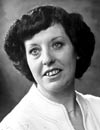 Betty Williams (1943 -) Williams along with Mairead Corrigan co-founded the Community of Peace People – an organisation dedicated to promoting a peaceful resolution to the Northern Ireland conflict. She was jointly awarded the Nobel Peace Prize with Corrigan in 1976.
Betty Williams (1943 -) Williams along with Mairead Corrigan co-founded the Community of Peace People – an organisation dedicated to promoting a peaceful resolution to the Northern Ireland conflict. She was jointly awarded the Nobel Peace Prize with Corrigan in 1976.
-------------------------------------------------------------------------------------------
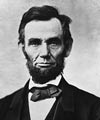 Abraham Lincoln (1809–1865) President of US during the American civil war. Lincoln made the famous Emancipation Proclamation (1863) declaring “that all persons held as slaves” within the rebellious states “are, and henceforward shall be free.” This proclamation was followed by the 13th Amendment to the US Constitution (1865) outlawing slavery.
Abraham Lincoln (1809–1865) President of US during the American civil war. Lincoln made the famous Emancipation Proclamation (1863) declaring “that all persons held as slaves” within the rebellious states “are, and henceforward shall be free.” This proclamation was followed by the 13th Amendment to the US Constitution (1865) outlawing slavery.
 Rosa Parks (1913–2005)
Civil Rights activist. She started the Montgomery bus boycott (1955)
through her refusal to give up her seat to a white person. She became a
prominent spokesperson and figurehead for the American civil rights
movement.
Rosa Parks (1913–2005)
Civil Rights activist. She started the Montgomery bus boycott (1955)
through her refusal to give up her seat to a white person. She became a
prominent spokesperson and figurehead for the American civil rights
movement.
-----------------------------------------------------------------------------------------
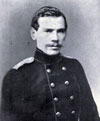 Leo Tolstoy (1828-1910) Author of War and Peace and committed to principles of non-violence. His literal interpretation of the ethical principles of Jesus Christ led to the creation of his non-violent philosophy. Tolstoy’s writing had a big impact on Gandhi and Martin Luther King.
Leo Tolstoy (1828-1910) Author of War and Peace and committed to principles of non-violence. His literal interpretation of the ethical principles of Jesus Christ led to the creation of his non-violent philosophy. Tolstoy’s writing had a big impact on Gandhi and Martin Luther King.
 14th Dalai Lama (1935 – ) The spiritual leader of Tibet, the Dalai Lama has sought to protect the interests of the Tibetans while promoting a non-violent approach to the Chinese. He teaches the importance of compassion for promoting happiness and inner peace.
14th Dalai Lama (1935 – ) The spiritual leader of Tibet, the Dalai Lama has sought to protect the interests of the Tibetans while promoting a non-violent approach to the Chinese. He teaches the importance of compassion for promoting happiness and inner peace.
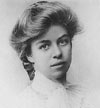 Eleanor Roosevelt
– A supporter of the rights of women and committed to the oppressed in
society, Eleanor also helped to draft the UN Declaration of human
rights.
Eleanor Roosevelt
– A supporter of the rights of women and committed to the oppressed in
society, Eleanor also helped to draft the UN Declaration of human
rights.
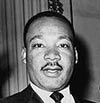 Martin Luther King
(1929 – 1968) Non-violent civil rights leader. Inspired the American
civil rights movement to achieve greater equality. Helped to organise
the 1963 March on Washington, where he gave famous ‘I have a dream’
speech. “I have a dream that one day this nation will rise up and
live out the true meaning of its creed: ‘We hold these truths to be
self-evident: that all men are created equal.’
Martin Luther King
(1929 – 1968) Non-violent civil rights leader. Inspired the American
civil rights movement to achieve greater equality. Helped to organise
the 1963 March on Washington, where he gave famous ‘I have a dream’
speech. “I have a dream that one day this nation will rise up and
live out the true meaning of its creed: ‘We hold these truths to be
self-evident: that all men are created equal.’
-----------------------------------------------------------------------------------------
 Mikhail Gorbachev
(1931– ) Leader of Soviet Union. Gorbachev oversaw the transition from
Communism to democracy in the Soviet Union and Eastern Europe and
allowed the Berlin Wall to come down. Gorbachev also instigated Glasnost, seeking to end restrictions on free speech and promote religious freedom.
Mikhail Gorbachev
(1931– ) Leader of Soviet Union. Gorbachev oversaw the transition from
Communism to democracy in the Soviet Union and Eastern Europe and
allowed the Berlin Wall to come down. Gorbachev also instigated Glasnost, seeking to end restrictions on free speech and promote religious freedom.
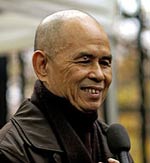
Thich Nhat Hanh (1926 – )Vietnamese monk who inspired the movement of engaged Buddhism. Hanh has been a prominent peace activist and has written extensively on incorporating Buddhist teachings into everyday life.
 William Wilberforce (1759 – 1833) – Campaigned against slavery, helping to outlaw slavery in Great Britain. The Slavery Abolition Act 1833, was passed three days after his death.
William Wilberforce (1759 – 1833) – Campaigned against slavery, helping to outlaw slavery in Great Britain. The Slavery Abolition Act 1833, was passed three days after his death.
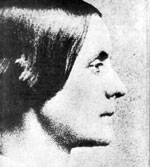 Susan B. Anthony. American suffragist and campaigner for women’s equal rights. Played a significant role in women gaining the vote in the US.
Susan B. Anthony. American suffragist and campaigner for women’s equal rights. Played a significant role in women gaining the vote in the US.
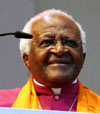 Desmond Tutu (1931 – ) Campaigner against apartheid in South Africa. Since the end of apartheid, Tutu has campaigned on a wide range of humanitarian issues, seeking to overcome racism, sexism, homophobia, AIDS and poverty.
Desmond Tutu (1931 – ) Campaigner against apartheid in South Africa. Since the end of apartheid, Tutu has campaigned on a wide range of humanitarian issues, seeking to overcome racism, sexism, homophobia, AIDS and poverty.
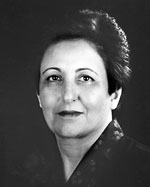 Shirin Ebadi. (1947 – ) Iranian judge and lawyer. She fought for the right for women to purse a legal career in Iran. She has also defended opposition dissidents who have fallen foul of the Iranian judicial system.
Shirin Ebadi. (1947 – ) Iranian judge and lawyer. She fought for the right for women to purse a legal career in Iran. She has also defended opposition dissidents who have fallen foul of the Iranian judicial system.
 Thomas Jefferson (1743-1826). Jefferson inspired the US bill of rights. As President, he sought to avoid war and promote peace. “We love and we value peace; we know its blessings from experience. We abhor the follies of war, and are not untried in its distresses and calamities.” – T.Jefferson
Thomas Jefferson (1743-1826). Jefferson inspired the US bill of rights. As President, he sought to avoid war and promote peace. “We love and we value peace; we know its blessings from experience. We abhor the follies of war, and are not untried in its distresses and calamities.” – T.Jefferson
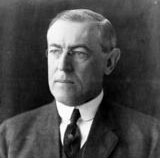 Woodrow Wilson. (1856-1924) Wilson tried very hard to keep the US neutral in the First World War. It was only after very significant provocation that he allowed the US to enter the war. However, Wilson did not enter the war with jingoism and enthusiasm; he knew how awful war could be. In 1918, he issued his Fourteen Points, which he hoped would avoid future conflict. This included his vision for a League of Nations, which would provide a forum for resolving future conflict.
Woodrow Wilson. (1856-1924) Wilson tried very hard to keep the US neutral in the First World War. It was only after very significant provocation that he allowed the US to enter the war. However, Wilson did not enter the war with jingoism and enthusiasm; he knew how awful war could be. In 1918, he issued his Fourteen Points, which he hoped would avoid future conflict. This included his vision for a League of Nations, which would provide a forum for resolving future conflict.
-------------------------------------------------------------------------------------------------
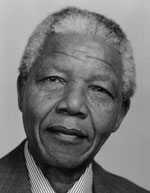
Nelson Mandela (1918–2013) Anti-apartheid leader. Mandela spent over twenty years in jail for his opposition to the racist apartheid system which excluded blacks from many areas of society. He was elected the first President of democratic South Africa in 1994. “I have cherished the ideal of a democratic and free society in which all persons live together in harmony and with equal opportunities.” – Nelson Mandela.
-----------------------------------------------------------------------------------------------
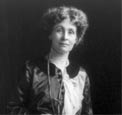
Women who fought for the vote – Suffragists who played a role in the fight for gaining women the right to vote around the world. Includes Elizabeth Cady Stanton, Ida B. Wells, Emily Pankhurst and Susan B. Anthony and Milicent Fawcett.
-----------------------------------------------------------------------------------------------
People who fought for Human Rights / Civil Rights #ቢንያም #ይባልህ
Malala Yousafzai Biography:
Women who changed the world:
SHARE YOUR PEACE :
By BINIAM YIBALEH ቢንያም: ይባልህ
What does “Peace” mean to ME ?
1-Peace is an active thing.
2- Peace is a continuing concept.
3-Peace must flow both ways to exist
4-Peace is a feeling that we can take a rest.
5-Peace gives you freedom to think and act.
6-Peace must transcends all understanding.
7-Peace is present in the absence of violence.
8-Peace is the lack of those unjustified feelings.2- Peace is a continuing concept.
3-Peace must flow both ways to exist
4-Peace is a feeling that we can take a rest.
5-Peace gives you freedom to think and act.
6-Peace must transcends all understanding.
7-Peace is present in the absence of violence.
9-Peace is no more violence, hate, greed,inhumanity.
10-Peace is the fact that there are no more man-made boundaries those seperating and dividing one people from another.
11-Peace includes serenity, wisdom and a broad perspective, good will expessed towards all from all, fruitful silence and joy in action.
---------------------------------------------------------------------------------------------
People who have promoted world peace
A list of people who have contributed to peace. These include efforts from politicians, humanitarians and spiritual figure.
Modern figures who have contributed to peace
Mother Teresa Biography

Mother Teresa (1910–1997) was a Roman Catholic nun who devoted her life to serving the poor and destitute around the world. She spent many years in Calcutta, India where she founded the Missionaries of Charity, a religious congregation devoted to helping those in great need. In 1979, Mother Teresa was awarded the Nobel Peace Prize and became a symbol of charitable, selfless work. In 2016, Mother Teresa was canonised by the Roman Catholic Church as Saint Teresa.
"It is not how much we give, but how much love we put in the giving.”----- Mother Teresa
Mother Teresa was born in 1910 in Skopje, the capital of the Republic of Macedonia. Little is known about her early life, but at a young age, she felt a calling to be a nun and serve through helping the poor. At the age of 18, she was given permission to join a group of nuns in Ireland. After a few months of training, with the Sisters of Loreto, she was then given permission to travel to India. She took her formal religious vows in 1931 and chose to be named after St Therese of Lisieux – the patron saint of missionaries.
On her arrival in India, she began by working as a teacher; however, the widespread poverty of Calcutta made a deep impression on her, and this led to her starting a new order called “The Missionaries of Charity”. The primary objective of this mission was to look after people, who nobody else was prepared to look after. Mother Teresa felt that serving others was a fundamental principle of the teachings of Jesus Christ. She often mentioned the saying of Jesus,
“Not all of us can do great things. But we can do small things with great love.”---- Mother Teresa
Mahatma Gandhi
Mohandas Karamchand Gandhi was an Indian lawyer who became the primary leader of India's independence movement. Better known as Mahatma Gandhi, he not only led India to independence from British rule but also inspired movements for civil rights and freedom across the world in several other countries. Best remembered for his employment of nonviolent means of civil disobedience, he led Indians in the Dandi Salt March to protest against the British-imposed salt tax and launched the Quit India Movement, a mass protest demanding "an orderly British withdrawal" from India. Born into a religious family in British India, he was raised by parents who emphasized on religious tolerance, simplicity and strong moral values. As a young man he went to England to study law and later started working in South Africa. There he witnessed rampant acts of racism and discrimination which angered him greatly. He spent over two decades in South Africa over the period of which he developed a strong sense of social justice, and led several social campaigns. Upon his return to India he became active in the Indian Independence Movement, ultimately leading his motherland to independence from the British rule. He was also a social activist who campaigned for women’s rights, religious tolerance, and reduction of poverty.--------------------------------------------------------------------------
 Betty Williams (1943 -) Williams along with Mairead Corrigan co-founded the Community of Peace People – an organisation dedicated to promoting a peaceful resolution to the Northern Ireland conflict. She was jointly awarded the Nobel Peace Prize with Corrigan in 1976.
Betty Williams (1943 -) Williams along with Mairead Corrigan co-founded the Community of Peace People – an organisation dedicated to promoting a peaceful resolution to the Northern Ireland conflict. She was jointly awarded the Nobel Peace Prize with Corrigan in 1976.-------------------------------------------------------------------------------------------
 Abraham Lincoln (1809–1865) President of US during the American civil war. Lincoln made the famous Emancipation Proclamation (1863) declaring “that all persons held as slaves” within the rebellious states “are, and henceforward shall be free.” This proclamation was followed by the 13th Amendment to the US Constitution (1865) outlawing slavery.
Abraham Lincoln (1809–1865) President of US during the American civil war. Lincoln made the famous Emancipation Proclamation (1863) declaring “that all persons held as slaves” within the rebellious states “are, and henceforward shall be free.” This proclamation was followed by the 13th Amendment to the US Constitution (1865) outlawing slavery. Rosa Parks (1913–2005)
Civil Rights activist. She started the Montgomery bus boycott (1955)
through her refusal to give up her seat to a white person. She became a
prominent spokesperson and figurehead for the American civil rights
movement.
Rosa Parks (1913–2005)
Civil Rights activist. She started the Montgomery bus boycott (1955)
through her refusal to give up her seat to a white person. She became a
prominent spokesperson and figurehead for the American civil rights
movement.-----------------------------------------------------------------------------------------
 Leo Tolstoy (1828-1910) Author of War and Peace and committed to principles of non-violence. His literal interpretation of the ethical principles of Jesus Christ led to the creation of his non-violent philosophy. Tolstoy’s writing had a big impact on Gandhi and Martin Luther King.
Leo Tolstoy (1828-1910) Author of War and Peace and committed to principles of non-violence. His literal interpretation of the ethical principles of Jesus Christ led to the creation of his non-violent philosophy. Tolstoy’s writing had a big impact on Gandhi and Martin Luther King. 14th Dalai Lama (1935 – ) The spiritual leader of Tibet, the Dalai Lama has sought to protect the interests of the Tibetans while promoting a non-violent approach to the Chinese. He teaches the importance of compassion for promoting happiness and inner peace.
14th Dalai Lama (1935 – ) The spiritual leader of Tibet, the Dalai Lama has sought to protect the interests of the Tibetans while promoting a non-violent approach to the Chinese. He teaches the importance of compassion for promoting happiness and inner peace. Eleanor Roosevelt
– A supporter of the rights of women and committed to the oppressed in
society, Eleanor also helped to draft the UN Declaration of human
rights.
Eleanor Roosevelt
– A supporter of the rights of women and committed to the oppressed in
society, Eleanor also helped to draft the UN Declaration of human
rights. Martin Luther King
(1929 – 1968) Non-violent civil rights leader. Inspired the American
civil rights movement to achieve greater equality. Helped to organise
the 1963 March on Washington, where he gave famous ‘I have a dream’
speech. “I have a dream that one day this nation will rise up and
live out the true meaning of its creed: ‘We hold these truths to be
self-evident: that all men are created equal.’
Martin Luther King
(1929 – 1968) Non-violent civil rights leader. Inspired the American
civil rights movement to achieve greater equality. Helped to organise
the 1963 March on Washington, where he gave famous ‘I have a dream’
speech. “I have a dream that one day this nation will rise up and
live out the true meaning of its creed: ‘We hold these truths to be
self-evident: that all men are created equal.’-----------------------------------------------------------------------------------------
 Mikhail Gorbachev
(1931– ) Leader of Soviet Union. Gorbachev oversaw the transition from
Communism to democracy in the Soviet Union and Eastern Europe and
allowed the Berlin Wall to come down. Gorbachev also instigated Glasnost, seeking to end restrictions on free speech and promote religious freedom.
Mikhail Gorbachev
(1931– ) Leader of Soviet Union. Gorbachev oversaw the transition from
Communism to democracy in the Soviet Union and Eastern Europe and
allowed the Berlin Wall to come down. Gorbachev also instigated Glasnost, seeking to end restrictions on free speech and promote religious freedom.
Thich Nhat Hanh (1926 – )Vietnamese monk who inspired the movement of engaged Buddhism. Hanh has been a prominent peace activist and has written extensively on incorporating Buddhist teachings into everyday life.
Humanitarian contributions to world peace
 William Wilberforce (1759 – 1833) – Campaigned against slavery, helping to outlaw slavery in Great Britain. The Slavery Abolition Act 1833, was passed three days after his death.
William Wilberforce (1759 – 1833) – Campaigned against slavery, helping to outlaw slavery in Great Britain. The Slavery Abolition Act 1833, was passed three days after his death. Susan B. Anthony. American suffragist and campaigner for women’s equal rights. Played a significant role in women gaining the vote in the US.
Susan B. Anthony. American suffragist and campaigner for women’s equal rights. Played a significant role in women gaining the vote in the US. Desmond Tutu (1931 – ) Campaigner against apartheid in South Africa. Since the end of apartheid, Tutu has campaigned on a wide range of humanitarian issues, seeking to overcome racism, sexism, homophobia, AIDS and poverty.
Desmond Tutu (1931 – ) Campaigner against apartheid in South Africa. Since the end of apartheid, Tutu has campaigned on a wide range of humanitarian issues, seeking to overcome racism, sexism, homophobia, AIDS and poverty. Shirin Ebadi. (1947 – ) Iranian judge and lawyer. She fought for the right for women to purse a legal career in Iran. She has also defended opposition dissidents who have fallen foul of the Iranian judicial system.
Shirin Ebadi. (1947 – ) Iranian judge and lawyer. She fought for the right for women to purse a legal career in Iran. She has also defended opposition dissidents who have fallen foul of the Iranian judicial system.Historical figures contributing to peace
 Thomas Jefferson (1743-1826). Jefferson inspired the US bill of rights. As President, he sought to avoid war and promote peace. “We love and we value peace; we know its blessings from experience. We abhor the follies of war, and are not untried in its distresses and calamities.” – T.Jefferson
Thomas Jefferson (1743-1826). Jefferson inspired the US bill of rights. As President, he sought to avoid war and promote peace. “We love and we value peace; we know its blessings from experience. We abhor the follies of war, and are not untried in its distresses and calamities.” – T.Jefferson Woodrow Wilson. (1856-1924) Wilson tried very hard to keep the US neutral in the First World War. It was only after very significant provocation that he allowed the US to enter the war. However, Wilson did not enter the war with jingoism and enthusiasm; he knew how awful war could be. In 1918, he issued his Fourteen Points, which he hoped would avoid future conflict. This included his vision for a League of Nations, which would provide a forum for resolving future conflict.
Woodrow Wilson. (1856-1924) Wilson tried very hard to keep the US neutral in the First World War. It was only after very significant provocation that he allowed the US to enter the war. However, Wilson did not enter the war with jingoism and enthusiasm; he knew how awful war could be. In 1918, he issued his Fourteen Points, which he hoped would avoid future conflict. This included his vision for a League of Nations, which would provide a forum for resolving future conflict.-------------------------------------------------------------------------------------------------

Nelson Mandela (1918–2013) Anti-apartheid leader. Mandela spent over twenty years in jail for his opposition to the racist apartheid system which excluded blacks from many areas of society. He was elected the first President of democratic South Africa in 1994. “I have cherished the ideal of a democratic and free society in which all persons live together in harmony and with equal opportunities.” – Nelson Mandela.
-----------------------------------------------------------------------------------------------

Women who fought for the vote – Suffragists who played a role in the fight for gaining women the right to vote around the world. Includes Elizabeth Cady Stanton, Ida B. Wells, Emily Pankhurst and Susan B. Anthony and Milicent Fawcett.
-----------------------------------------------------------------------------------------------

Comments
Post a Comment